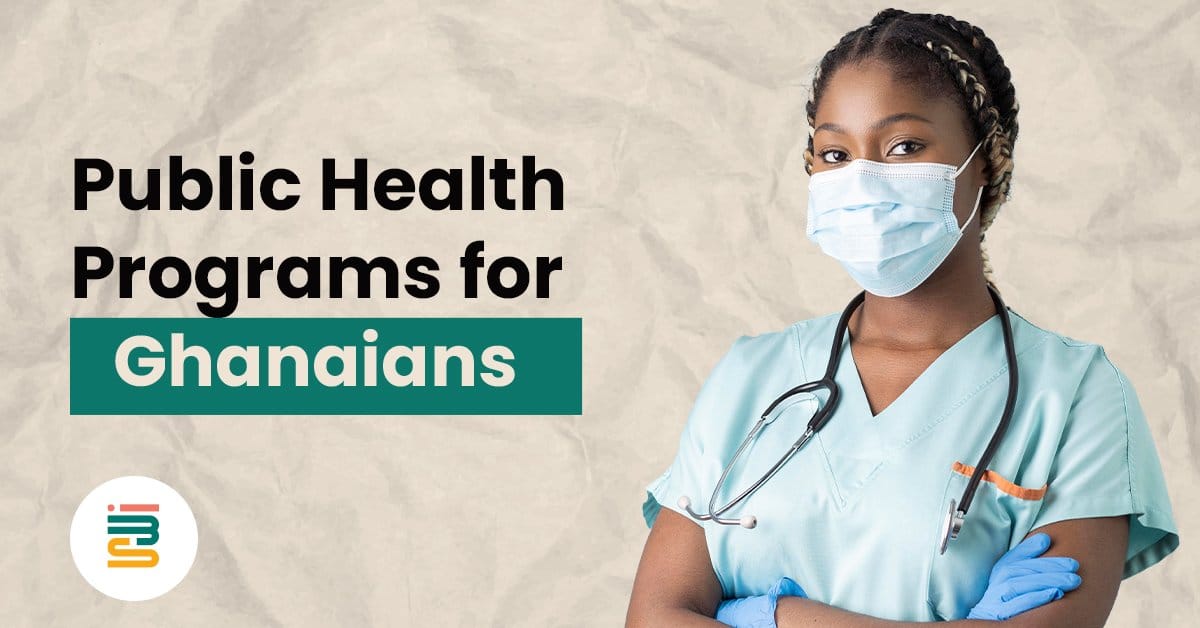Public health programs abroad offer invaluable opportunities for Ghanaians to enhance community well-being.
In exploring these initiatives, Ghanaians can access a diverse array of healthcare, disease prevention, and health education programs aimed at improving public health outcomes.
This article delves into the wealth of public health programs available abroad specifically for Ghanaians, covering areas such as maternal and child health, communicable and non-communicable diseases, school health education, environmental health, and more
Read Also: Requirements to study nursing In USA for international students
Maternal and Child Health
Safe Motherhood Program
Dedicated initiatives ensuring safe pregnancies and deliveries for mothers, focusing on prenatal care, skilled birth attendance, and access to essential maternal health services.
Read Also: Requirements to study nursing In UK for international students
Newborn Health Program
Targeted efforts to reduce neonatal mortality rates by promoting newborn care practices, providing essential newborn care services, and ensuring access to skilled healthcare professionals.
Read Also: Requirements to study nursing In Canada for International Students
Reproductive and Child Healthcare
Comprehensive programs addressing the reproductive health needs of women and children, including family planning services, antenatal and postnatal care, and child immunization programs to prevent diseases and promote healthy growth and development.
Read Also: Universities In Canada for masters with low GPA
Communicable Diseases
Malaria Control:
Robust programs focused on preventing, diagnosing, and treating malaria infections, including distribution of insecticide-treated bed nets, indoor residual spraying, and access to effective antimalarial medications.
HIV/AIDS Control
Comprehensive strategies aimed at preventing HIV transmission, increasing access to HIV testing and counseling, promoting antiretroviral therapy for HIV-positive individuals, and reducing stigma and discrimination.
Tuberculosis Control
Multi-pronged approaches to TB prevention, diagnosis, and treatment, including active case finding, provision of directly observed treatment, short-course (DOTS), and infection control measures to limit TB transmission.
Read Also: Universities that accept low GPA for masters in USA
Immunization:
Extensive immunization programs targeting vaccine-preventable diseases such as measles polio, diphtheria, and tetanus, ensuring high vaccination coverage rates among children and vulnerable populations.
Neglected Tropical Diseases Control
Integrated efforts to combat neglected tropical diseases (NTDs) such as schistosomiasis, lymphatic filariasis, and soil-transmitted helminthiasis, including mass drug administration, vector control, and health education initiatives.
Read Also: Fully funded MBA programs for Ghanaian students
Non-Communicable Diseases
Non-communicable diseases (NCDs) pose a significant health challenge in Ghana, requiring targeted interventions to reduce their impact on individuals and communities. Public health programs aimed at addressing NCDs focus on prevention, early detection, and management of conditions such as cardiovascular diseases, diabetes, cancer, and chronic respiratory diseases.
These programs emphasize health education and promotion of healthy lifestyles, including regular physical activity, balanced nutrition, smoking cessation, and moderation of alcohol consumption. Additionally, efforts are made to improve access to essential healthcare services for NCDs, ensuring early diagnosis, treatment, and management to prevent complications and improve outcomes.
Read Also: Study Digital marketing abroad
School Health Education Services:
School health education services play a role in promoting health literacy and encouraging positive health behaviors among students. These programs are designed to empower students with the knowledge, skills, and attitudes needed to make informed decisions about their health and well-being.
School-based health education covers a wide range of topics, including nutrition, physical activity, mental health, sexual and reproductive health, substance abuse prevention, and personal hygiene. Through interactive lessons, workshops, and extracurricular activities, students learn about the importance of healthy behaviors and how to adopt them in their daily lives.
Read Also: Engineering courses in the USA
Environmental Health
Environmental health programs focus on identifying and addressing environmental factors that may impact public health. These programs aim to prevent or mitigate exposure to hazards such as air and water pollution, hazardous waste, and unsafe living conditions.
In Ghana, environmental health initiatives target areas such as sanitation, water quality, food safety, and vector control to prevent the spread of infectious diseases and protect communities from environmental hazards. Efforts are made to improve access to clean water and sanitation facilities, promote proper waste management practices, and reduce pollution levels in the environment.
Read Also: Tech programs abroad
Health Promotion
Health promotion initiatives plays a sensitive role in empowering individuals and communities to adopt healthy behaviors and lifestyles. These programs aim to prevent disease, promote well-being, and reduce health disparities through education, advocacy, and environmental changes.
Program Implementation
Health promotion programs are implemented through a variety of strategies, including community-based interventions, mass media campaigns, and policy changes. These programs focus on raising awareness, providing education, and creating supportive environments that facilitate healthy choices and behaviors.
Health System Strengthening
Health promotion efforts are supported by strengthening health systems to ensure access to quality healthcare services. This includes improving infrastructure, enhancing healthcare delivery systems, and building capacity among healthcare providers to deliver effective health promotion interventions.
Through program implementation and health system strengthening, health promotion initiatives aim to empower individuals and communities to take control of their health and well-being, leading to improved health outcomes and quality of life.
Read Also: Universities that accept low GPA for masters in USA
Universities abroad that offer Public Health programs for Ghanaians
These institutions offer diverse opportunities for Ghanaian students seeking to pursue Public Health studies internationally.
Renowned universities worldwide feature comprehensive Public Health programs, covering areas such as epidemiology, health policy, environmental health, and community health promotion.
Through these programs, students gain theoretical knowledge and practical skills crucial for addressing global health challenges.
Institutions in countries like the United States, Canada, the United Kingdom, Australia, and others welcome Ghanaian applicants to their Public Health courses. By studying abroad, Ghanaian students can broaden their perspectives, engage with diverse healthcare systems, and contribute to improving health outcomes globally.
Consider these universities abroad as pathways to fulfilling your aspirations in the field of Public Health.



